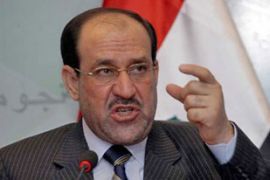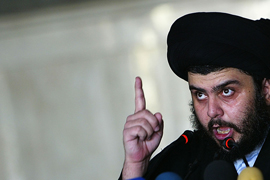Iraq asks US to reopen talks
Baghdad wants to discuss possible amendments to proposed deal to keep US troops in Iraq.

Al-Dabbagh described the amendments as “essential” before the prime minister can submit the draft to parliament.
Al-Maliki has said he will not submit the draft to the 275-member legislature unless he is confident it can win overwhelming approval.
In Washington, Dana Perino, the White House press secretary, said the Bush administration may talk to the Iraqis about their proposed amendments.
‘High bar’
But she added that “it will just be a very high bar for them to clear for us to change anything” in the agreement.
She said US officials had not seen the amendments list although an official at al-Maliki’s office said some of the amendments had already been forwarded to US diplomats in Baghdad.
The official said the changes were mostly attempts to clarify parts of the text that the cabinet found open to interpretation.
“It might be something we can work with, it might not,” Perino said.
“We have provided them with our best thinking on it, our best offer. We think that the door is pretty much shut on these negotiations.”
For nearly two weeks, Iraqi politicians have been considering the draft agreement, which would keep US troops in Iraq until 2011.
 |
| Shia leader al-Sadr has rejected the agreement outright [ GALLO/GETTY] |
The draft would also give the Iraqis a greater role in supervising US military operations and allow Iraqi courts to try US soldiers and contractors accused of major crimes off duty and off base.
But critics say the draft does not go far enough in protecting Iraqi sovereignty, and major Shia politicians said last week that the agreement stands little chance of approval in its current form.
One option being floated privately is to ask the UN Security Council to renew the mandate under which foreign forces currently operate in Iraq for six months or a year until a way out of the deadlock is found.
But it is unclear whether Russia, China and other council members may raise their own demands and delay the process.
Political storm
A political storm in Iraq, meanwhile, is looming with most of the major political groups reluctant to take a clear position for or against the troop deal with the US.
Only the group led by Muqtada al-Sadr, the anti-US Shia leader, has taken a public stand on the agreement.
The group, which holds 30 seats in parliament, has rejected it outright.
Al-Maliki has not publicly committed himself to the current draft.
Iraqi leaders have objected to what they describe as unjustified threats by senior American officials about what would happen if the year ends without an agreement or a new mandate.
“I don’t think there are any Iraqis who think that they are ready to do this on their own, deep down,” Perino said.
“Iraq still has a lot of violence that they have to deal with. Our soldiers are the ones who are there to help them deal with it. And they’re going to need our help for some time.”